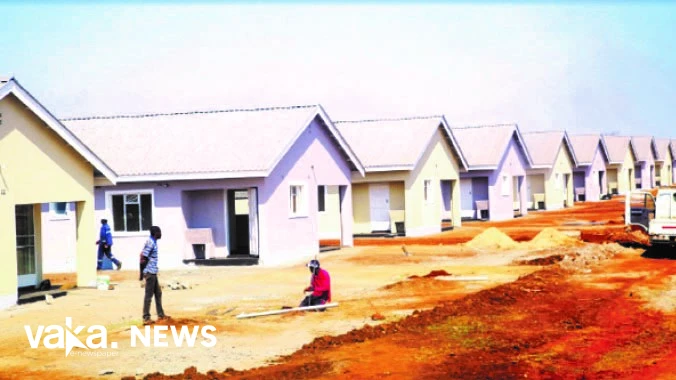‘Informal sector potential growth node for housing’
- Category: Real Estate

- By Dion Kajokoto
Zimbabwe’s vibrant informal sector could become a key driver of homeownership if banks open doors to tap into the market segment by easing mortgage requirements and offering longer loan terms, according to the latest report by Integrated Properties.
Many people, especially those employed in the informal sector, have historically been unable to fulfill their aspiration of becoming homeowners due to the restricted availability of official mortgage choices. Official figures from the Reserve Bank of Zimbabwe (RBZ) show that in 2023, formal mortgages accounted for only 8,85 percent of all lending in Zimbabwe. The number draws attention to a significant bottleneck: short loan terms and high interest rates, which make homeownership unattainable for many. These factors average 12 percent annually.
Because of their perceived dangers, banks are cautious and use restrictive lending practices to further tighten credit requirements. Furthermore, low deposit mobilization reduces the banks' capital available for mortgages, and a lack of reasonably priced housing options and stagnating property values limit the options available to prospective homeowners and reduce the value of their collateral to lenders. Millions of people in Zimbabwe are employed in the informal sector, which is thought to contribute significantly to the country's gross domestic product. Many in this industry do not have access to conventional financial services, such as mortgages, despite their economic contribution.
"Banks should modify mortgage requirements to be more inclusive of informal sector participants, given the significant contribution of the informal sector to Zimbabwe's economy," the report stated. By taking down obstacles that prevent this industry from receiving mortgage finance, we can unleash its potential and grow the market. "To help borrowers afford their mortgages more, banks ought to think about extending the mortgage term.
"Considering high interest rates, longer mortgage terms might lead to reduced monthly repayments, making homeownership accessible to a wider population section. This action can boost the housing market, draw in additional debtors, and accelerate economic expansion. The report also stated that "careful consideration of the impact on risk and profitability is necessary." According to the report, putting the recommendations into practice will not only solve the problems facing the mortgage market but also move it in the direction of greater efficiency and sustainability.
More inclusive lending choices that unlock the potential of the informal sector might revolutionize Zimbabwe's housing industry, according to South African property expert Julliet Rusununguko. "This could help millions of people realize their dream of becoming homeowners and improve the economy as a whole," she said. Even when people in the unofficial sector have proven they have the financial wherewithal to repay loans, legal mortgages are nevertheless difficult to obtain because of the absence of conventional job records. Potential for lenders and borrowers alike may be unlocked by customizing mortgage products and risk assessment techniques for the industry.
Wellington Bonda, an auto parts dealer in Gazaland, an unofficial business district in Harare, said, "I think many could qualify for mortgages, even though I appreciate the local banks' need for caution." Current requirements, however, can provide difficulties. For instance, title deeds, which many of us lack, are typically required as security by banks. Furthermore, our unofficial company revenue streams may be less reliable, which makes it challenging for banks to evaluate our creditworthiness," Mr. Bonda continued. In addition to suggesting inclusion, the paper provides banks with a three-pronged plan to optimize the mortgage market's potential.
First, by offering pre-approved mortgages, which promise to expedite the process to give sellers speedier transactions and draw buyers with ready financing, the banks can fully realize the potential of the nation's mortgage industry. In order to solve affordability issues and maybe boost bank profitability, banks can also implement backward integration, in which they build affordable homes and provide mortgage packages. This strategy has many benefits, such as giving borrowers access to more reasonably priced home options and lessening their dependency on outside funding sources. Furthermore, it has the potential to increase banks' revenue through development process earnings and mortgage-related fees.
Nonetheless, banks must carefully evaluate the current state of the economy, consumer demand, and related risks. The research also suggested collaborating with licensed real estate agents who possess in-depth knowledge of the local market. The paper suggests that green mortgages should leverage the increasing number of environmentally concerned consumers by providing incentives for eco-friendly home upgrades.
Banks can enhance mortgage utilization, accommodate varied buyer requirements, and promote sustainability and financial inclusion by implementing these inventive tactics. All things considered, Zimbabwe's real estate market has a mixed bag of prospects and problems for 2024. While big infrastructure projects provide rays of hope, uncertainty is cast by the absence of clarity on important fundamentals.
While foreign direct investment, low-interest rates, a functional mortgage framework, stable currency, consistent policies, and clear property rights traditionally drive real estate development worldwide, Zimbabwe currently faces a lack of clarity on these very fundamentals, raising concerns for investors and developers.
The national infrastructure projects offer a potential lifeline for the industry. These projects, with their long-term return on investment, significant capital needs, and high-risk sensitivity, heavily rely on the very fundamentals currently lacking.
However, the projects can give local suppliers and contractors a much-needed boost if the government prioritizes local participation and makes sure payments are made on schedule.






